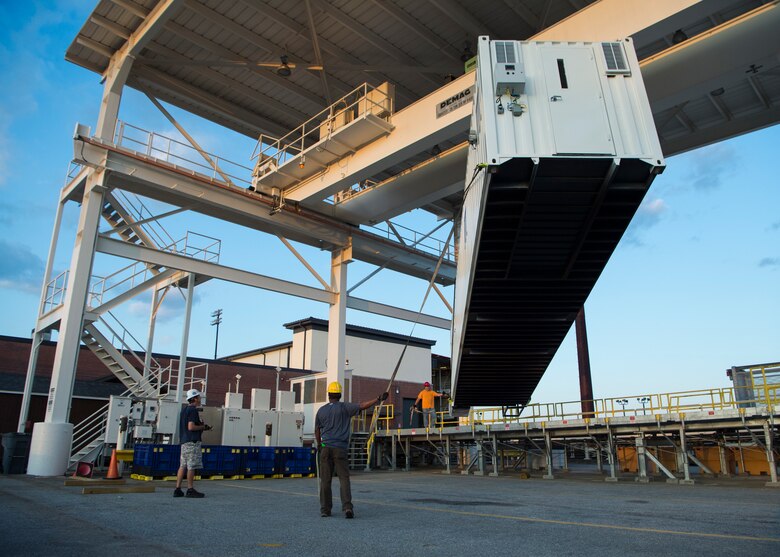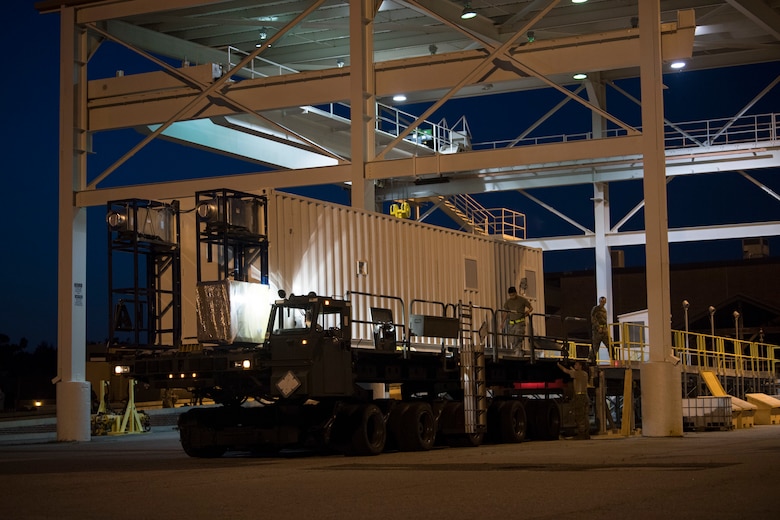The Air Force Life Cycle Management Center's Air Force Chemical, Biological, Radiological and Nuclear Defense Systems Branch partnered with the Joint Program Executive Office for CBRN Defense, along with many other organizations across the Department of Defense and academia, to deliver an isolation container prototype to Joint Base Charleston, South Carolina, April 21, to test for potential use as a transport module for individuals infected with the COVID-19 virus and other highly infectious diseases.
Rapidly developed in response to the United States Transportation Command's Joint Urgent Operational Need, the Negatively Pressurized Conex, or NPC, is designed to fit inside of a C-17 Globemaster III, and enable the safe transport of as many as 28 patients both ambulatory and litter, and teams of medical professionals to medical facilities around the globe.
"The goal of the NPC is to help us keep infectious organisms contained, in order to prevent the aircrew, and medical professionals on board the aircraft from being exposed," said Capt. Alexis Todaro, NPC program manager. "The container is negatively pressurized; fans are continuously pulling the air from within the unit through high-efficiency particulate filters to prevent any exposure to the aircraft."
The container includes an attached anteroom - also under negative pressure - where medical professionals can safely change into or out of their medical equipment in order to safely administer patient care, or exit the unit into the aircraft without risking contamination.
"We acquired one system (NPC prototype), and will put it through a series of tests to make sure it contains bio organisms, meets the needs of the aeromedical evacuation teams and that it's safe to fly on the C-17," said Capt. Kerollous Marzouk, program test lead for the NPC. "After we can provide those three things, we will provide this information to leadership for a procurement decision."
The NPC prototype, to include design and fabrication, was awarded to a commercial team of UTS Systems, Highland Engineering Inc., and Delta Flight Products using an Other Transactional Authority contract. The program management team led by Todaro, and Joe Novick, NPC deputy program manager, with the support of Army Contracting Command, slashed a four month contracting award process to just seven days with delivery of the prototype only 13 days after contract award. All associated prototype and testing cost approximately $2 million.
The NPC effort highlights just one of the many ways that Air Force Materiel Command units are supporting the Department of Defense-wide response to the coronavirus pandemic, leveraging contracting authorities for faster acquisition of priority warfighter needs.
Following the conclusion of testing scheduled for April 30, the USTRANSCOM and Air Mobility Command leadership will make a decision on procurement of the NPC with the expected first delivery systems arriving for operations by the end of May.
"Our goal is to provide Airmen with protective capabilities at the speed of relevance and that's what we are doing," said Lt. Col. Paul Hendrickson, AFLCMC materiel leader and NPC lead. "The prototype has the potential to provide safe transport of our Airmen, dependents and anyone needing care, while ensuring the safety of aircrew and aeromedical staff."

Civilians from the 437th Aerial Port Squadron position a Negatively Pressurized Conex prototype after its delivery to Joint Base Charleston, S.C., April 21, 2020. The NPC was rapidly developed and designed to fit inside both C-5 Galaxy and C-17 Globemaster III aircraft to enable safe transport of up to 28 patients, as well as teams of medical professionals to medical facilities around the globe. (U.S. Air Force photo by Staff Sgt. Chris Drzazgowski)

Airmen from the 437th Aerial Port Squadron use a K-Loader to move a Negatively Pressurized Conex prototype after it was delivered to Joint Base Charleston, S.C., April 21, 2020. The NPC will be tested for potential use as a transport module for individuals infected with the COVID-19 virus and other highly infectious diseases. (U.S. Air Force photo by Staff Sgt. Chris Drzazgowski)






